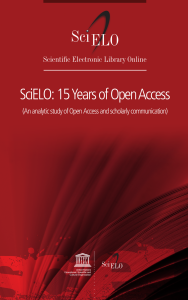 UNESCO and SciELO jointly launch SciELO – 15 years of Open Access in three languages – English, Portuguese and Spanish. The document provides a detailed account on the origin, context, significance and raison d’être of SciELO – Scientific Electronic Library Online1, which is a model for cooperative electronic publishing of scientific journals on the Internet. The publication summarizes the contribution of SciELO in scientific communication, notes its efficient ways to assure universal visibility and accessibility of scientific literature. The document is published to provide a best case practice model that can be replicated in other parts of the world. UNESCO and SciELO stand committed to support interested countries or a group of Member States to initiate the SciELO model of Open Access journal publication.
UNESCO and SciELO jointly launch SciELO – 15 years of Open Access in three languages – English, Portuguese and Spanish. The document provides a detailed account on the origin, context, significance and raison d’être of SciELO – Scientific Electronic Library Online1, which is a model for cooperative electronic publishing of scientific journals on the Internet. The publication summarizes the contribution of SciELO in scientific communication, notes its efficient ways to assure universal visibility and accessibility of scientific literature. The document is published to provide a best case practice model that can be replicated in other parts of the world. UNESCO and SciELO stand committed to support interested countries or a group of Member States to initiate the SciELO model of Open Access journal publication.
Highlighting the significance of the publication, Dr. Indrajit Banerjee, Director of the Division of Knowledge Societies, Communication and Information Sector, UNESCO noted “SciELO was launched four years before the Budapest Declaration, and six years before the Berlin Declaration on Open Access and pioneered the concept of Open Access and brought research to the easy reach of the common people. From 10 journals at a public workshop in São Paulo on its inception year to the current level of 1000 journals and 500,000 freely downloadable articles is a remarkable feat and an example of Open Access approach par-excellence!”
Similarly, noting the significance of the publication, Mr. Abel Packer, Director of SciELO stated that “the pioneering spirit and scope of SciELO is to improve the quality, visibility, usage and impact of journals that are available Openly. SciELO integrates the functions of indexing, journal performance evaluation, online open access publication and dissemination following international standards of the highest quality.” SciELO is implemented through a network of national collections of journals that extends through 16 countries, most of Latin American and Caribbean plus Portugal, South Africa and Spain.
Following the mandate given to UNESCO in 2009, UNESCO has been working in the field of Open Access to strengthen the organization’s clearing-house mandate. The 187th session of the Executive Board approved UNESCO’s strategy for the promotion of Open Access to scientific information and research2, which was also adopted by the General Conference at its 36th session. Implicit in the strategy was to disseminate key approaches to Open Access that are not only pioneering but also are path-breaking that set a replicable example to the whole world. The current publication is published within the framework of the same mandate.
SciELO (The Scientific Electronic Library Online) is an electronic library of Open Access Journals. It is an integral part of a project being developed by FAPESP – Fundação de Amparo à Pesquisa do Estado de São Paulo and created in partnership with BIREME – the Latin American and Caribbean Center on Health Sciences Information. Since 2002, the Brazilian National Council for Scientific and Technological Development (CNPq) also supports SciELO.
Notes
1 PACKER, A.L., et al., orgs. SciELO – 15 Years of Open Access: an analytic study of Open Access and scholarly communication. Paris: UNESCO, 2014. ISBN 978-92-3001-237-3. Available from: http://dx.doi.org/10.7476/9789230012373.
2 Open Access to Scientific Information. Unesco. 2014. Available from: http://www.unesco.org/new/en/communication-and-information/access-to-knowledge/open-access-to-scientific-information/
Como citar este post [ISO 690/2010]:















Recent Comments